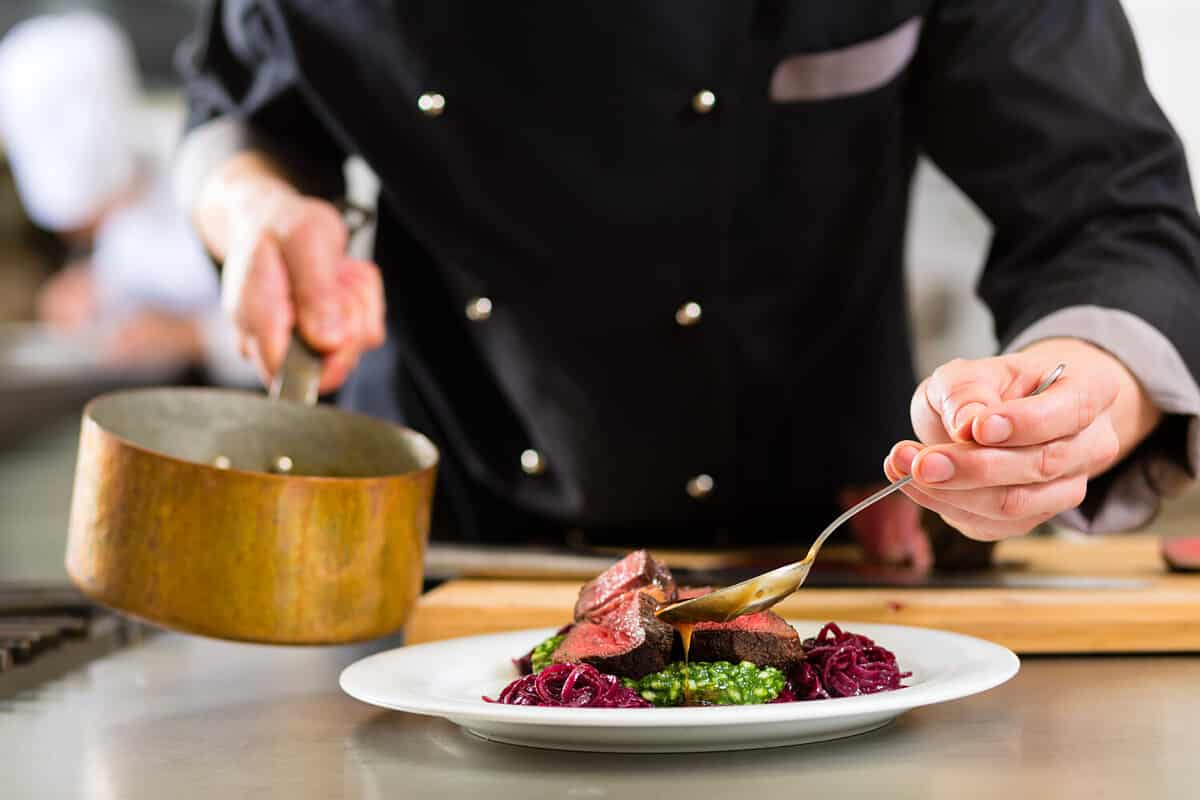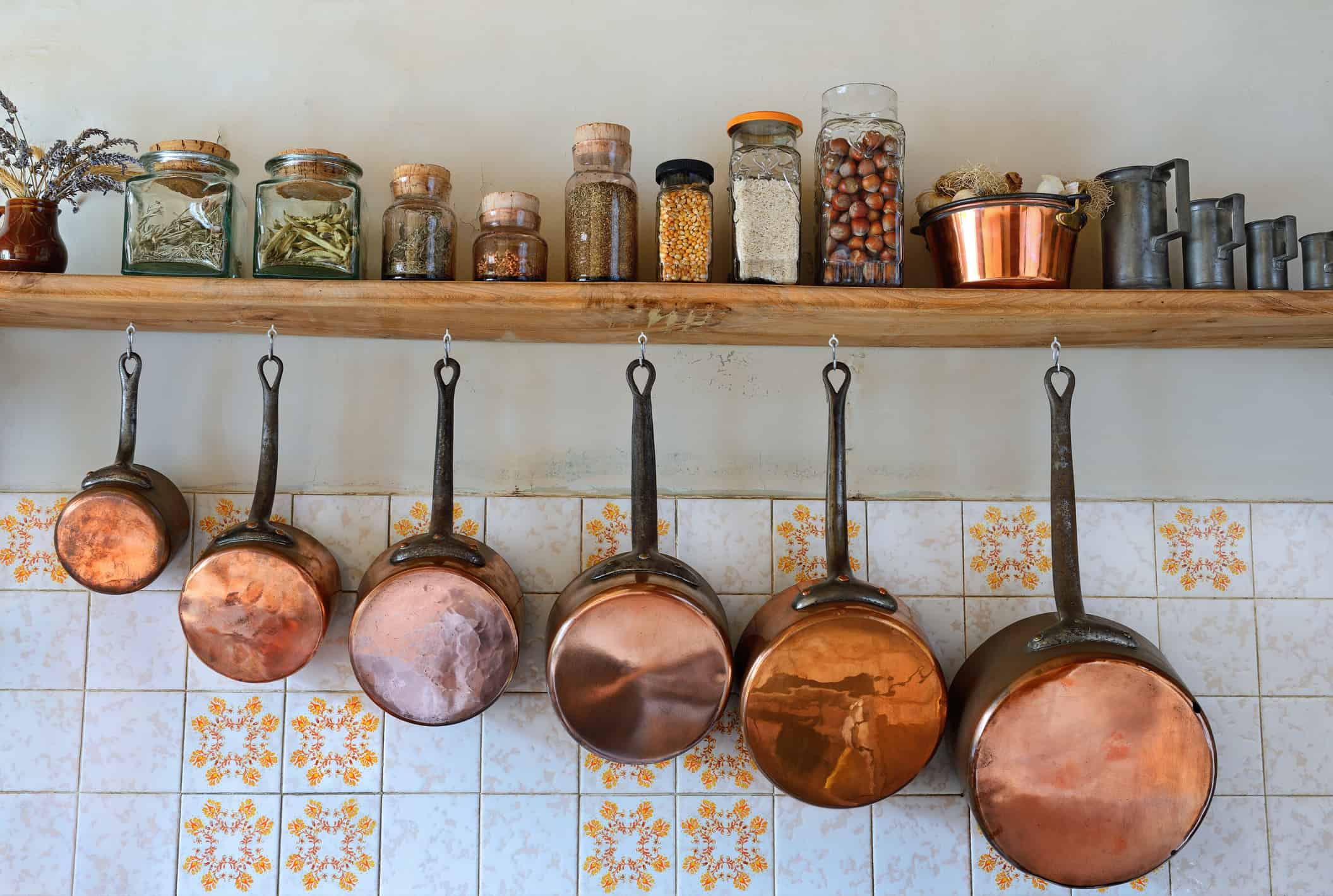If you love to cook, then chances are good that you have at least one copper pot in your kitchen arsenal. If so, is it used often, or do you typically shy away from using it? Most people have an opinion one way or another. Today, we’ll tell you about the reasons why you should avoid cooking with copper, as well as some alternatives that can make your next meal a hit.
What’s the Deal With Copper Cookware?
The process of creating copper pots and cookware begins by using a blank disc of metal that is set on a lathe. As the lathe spins, the copper is pressed into a roller, and it gradually takes the shape of a pot. Numerous discs of copper can be used so the manufacturer can achieve the desired thickness. This is a process that requires extensive training and tons of practice. It’s a more complicated way to create a copper pan, but it’s not the only way.
Many manufacturers create pressed copper, which is when a blank of copper is placed on the form of a pan, and then a mechanical arm lowers and presses it down into the proper shape. There’s also rolled copper. That’s when sheets of copper are laid out and then bent into shape by hand, and then the seams are joined.
There’s no need to become overly concerned about how your particular copper pan is produced. Whether it’s pressed or spun, you’ll still get the same quality.
As for the handle, it’s usually attached with copper rivets that are heated until softened and then hammered into place. Many copper pans have handles made of cast iron because it doesn’t heat up as quickly, so you won’t burn your hand. Finally, a stainless steel liner is often bonded to the copper shell since copper can be toxic on its own.
Reasons to Avoid Cooking With Copper
At this point, you may be wondering if there’s any real difference between cooking with copper and any other type of cookware. Like with the other options, a lot of it depends on what you’re cooking and how you operate in your kitchen. However, there are some general reasons why we say you should avoid cooking with copper.
1. It’s Expensive
One of the most significant reasons to avoid cooking with copper is that just purchasing the cooking supplies may put you in debt. A single copper pan can cost at least $200. If you want a set so you get an even cook across your entire meal, you could pay upwards of $1,000 for an entire set. Do you have that much money just to change to a different type of pan? On a good note, the pans will likely last a while, but the fact that you may need to dip into your savings account just to get some cookware can be a major drawback.
2. You Need To Practice Using Copper
One of the most profound attributes of copper pans is both a blessing and a curse depending on how experienced you are in the kitchen. Copper heats up extremely quickly, so as you’re getting used to them, you’ll likely burn a lot of food. Some ingredients, like bacon and garlic, can overcook in just a few seconds if the heat is too high.
3. It Cools Down Very Quickly
The need for practice doesn’t end there because, while copper heats up quickly, it doesn’t retain that heat well, especially when you turn off the heat or take the pan off of the heat. That means that your food could cool down quickly, so you need to find the right balance. It’s not easy. So, you can’t just buy the pans and plan to cook a perfect meal right out of the box.
4. Copper Can Lead to a Metallic Taste
Just like carbon steel, aluminum, and cast iron, copper is a reactive metal. That means when it’s exposed to acidic foods like lemons and tomatoes, it can lead to small bits of copper that will leak into the food. It won’t be enough to cause serious harm when you eat it, but it can cause the food to have a metallic taste. The way to eliminate that possibility is to ensure that your copper pan has a tin or stainless steel lining on the interior so the reactivity won’t be an issue.
5. Food Sticks Easily
Looks can be deceiving when it comes to copper pans. Although it appears smooth, copper actually has pores that expand and contract, and when it does, it can grip the food during heating. You can reduce that stickiness by pre-heating the pan, adding oil, and allowing the food to form a crust before you move it. It’s not the most time-consuming task in the world, but it's something you’ll want to remember to do each time.
6. Gets Dirty and is High Maintenance
Many people choose their cookware based on how easy it is to clean, but if you go with copper, you’ll find it takes some additional maintenance. That’s because copper is softer than other metals, so it’s prone to scratch and dent while cooking if you’re not careful. It’s also prone to oxidation and corrosion. You’ve probably witnessed that before if you’ve seen other copper items turn green over time.
To prevent oxidation from occurring, you’ll need to polish your copper pans regularly. You can maintain copper pots by mixing vinegar, salt, and water and then use it to gently scrub the pots.
7. Can Only be Used on a Gas or Electric Stove
If all you ever use is an electric or gas stove, then you may not have a problem here. However, if you ever use an induction stove, then you may be in trouble. Induction ovens work by creating a magnetic field that creates heat for your cookware. The issue is that copper is not magnetic, so that process won’t work. Your only chance of success is to find a copper pan with steel on the bottom.
8. The Pans are Very Heavy
If you plan to flip pancakes and have a lot of movement while cooking, then cooper may not be a good choice because it’s much heavier than other forms of cookware, and thus is harder to maneuver. In fact, a copper pan is about one pound heavier than many stainless steel options.
9. You Must Be Careful When You Buy
One of the main reasons to avoid cooking with copper is that you need to be very cautious when you purchase the cookware. Due to the high manufacturing costs, few brands produce copper pans, so buying them may be harder than it seems. Plus, you need to do a lot of research because there are many knockoffs from companies that aren’t exactly being honest about what they’re selling. Be cautious of companies that say they’re selling a copper pan, but what they’re really selling is aluminum with a copper-colored interior and exterior.
Are There Any Benefits to Cooking With Copper?

The cookware you choose will often depend on how you operate in the kitchen.
©Kzenon/Shutterstock.com
So far, you may have the impression that copper should be avoided like the plague, but it all really comes down to use and your experience in the kitchen. The truth is that there are some perks to using copper.
It Looks Nice
One of the main reasons that many chefs fill their kitchens with copper cookware is because, even though there are downsides, it does have an elegant appearance. These pans have a warm, copper color and an old-fashioned look.
They Heat Quickly
One of the drawbacks of copper cookware can also be a benefit if you know how to use it. Copper heats up very quickly because of its high thermal conductivity. Water in a copper pan can begin to boil after only a few minutes.
The other upside is that copper is also very reactive, and you’ll notice the change in cooking temperature almost immediately. This is important when cooking fish and proteins that need a precise temperature. Copper is also good when cooking with sugar because it can heat up and cool down quickly, so it doesn’t burn.
Copper pans also provide even heating across the entirety of the pan’s base. That makes it better than pans made out of cast iron, which will have hot and cold spots.
It’s Long Lasting
Copper is heavy duty and so it will last a long time. That’s a good thing since copper costs so much to begin with. If you take care of it, then a copper pan can last a lifetime. As a potential downside, the tin interior of the pan can go bad over time. However, the inside can be retinned every 10 years or so.
What to Use Instead of Copper
If you’ve decided to avoid cooking with copper and you want to try something different, know that you have options. Here are alternatives to consider.
Cast Iron – This option is affordable and durable, and it’s also quite versatile. It can handle high heat and work on a stovetop or in the oven. The one downside of cast iron is that it takes some extensive maintenance to keep it clean.
Stainless Steel – If you want to avoid cooking with copper, stainless steel might be another suitable alternative. It also heats up quickly, it’s dishwasher safe, and it won’t affect the taste of your food when cooking with acid. However, it doesn’t distribute heat as well as copper.
Carbon Steel – As the name suggests, carbon steel pans are made out of some carbon and iron. As a result, they heat quickly and retain heat well. The pans also allow you to cook food that provides a rich, grilled flavor. It’s also a much more lightweight option than copper, so it’s easier to use in a busy kitchen.
Aluminum – You can get pans that are made out of straight aluminum or anodized aluminum, and both are affordable and lightweight. They both retain heat well. However, like copper, aluminum reacts with acidic foods and can affect the taste.
Ceramic – If you use ceramic, you’re actually using aluminum with a silicon finish. The good news is that ceramic is nonstick, and it’s free of dangerous chemicals. However, over time, the nonstick can wear away, so it’s not as great of an investment as copper.
Nonstick – A pan that is just advertised as nonstick is easy to use and clean after a meal. However, once that nonstick coating chips, high heat can often expose food to the chemicals that make the pan nonstick.
Conclusion
So there you have it. Multiple reasons why you should avoid cooking with copper and several alternatives that you can consider if you want to prepare the best food possible. Granted, there are some good points about copper. However, you should do your research so you can make the best choice for your kitchen.
The image featured at the top of this post is ©therry/ via Getty Images
